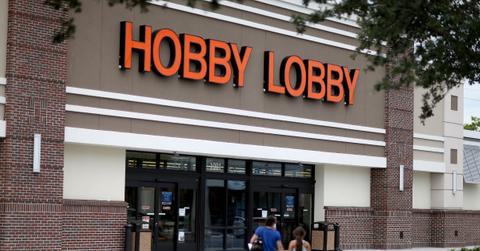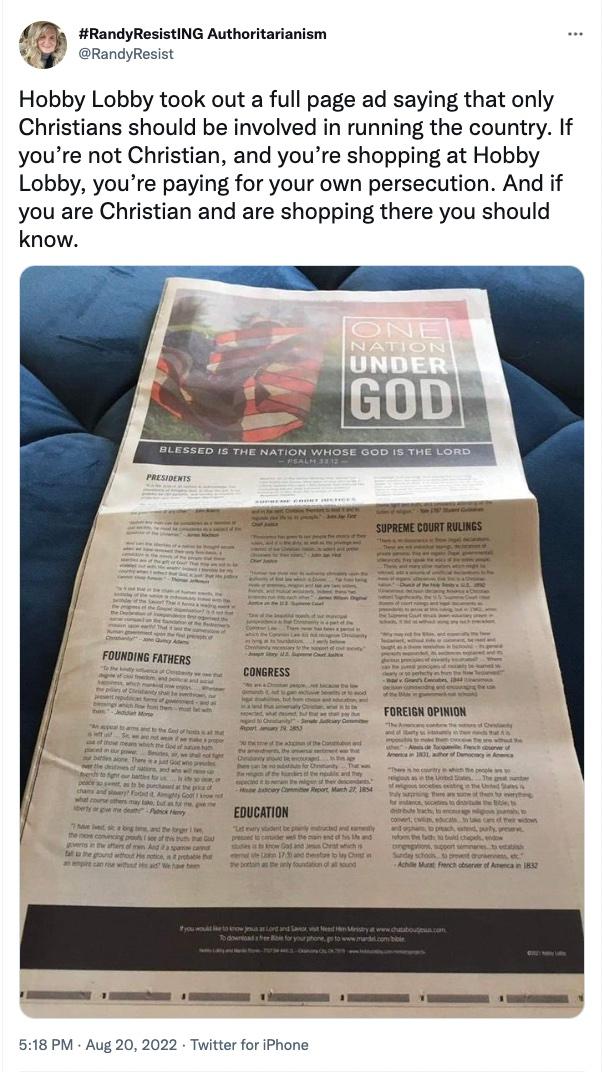If Hobby Lobby Had a Hobby, It Would Be Stirring Up Controversy
Updated Dec. 1 2023, 11:22 a.m. ET

“I would rather make crafts from stuff I find in a dumpster than shop at Hobby Lobby,” declared Twitter user @86Whitemoonlily. “Forever done with Hobby Lobby. I'll drive the extra 5 miles to Michael's. #BoycottHobbyLobby," opined user @africanpride_00.
The platform was ablaze with hate for the American craft retailer in August 2022 after a photo of its full-page Independence Day ad, which ran in several newspapers across the U.S., went viral.
Tweeted by @RandyResist in late August, the ad was titled "One Nation Under God" and included the Bible verse "Blessed is the Nation whose God is the lord.”
It also shared quotes from our founding fathers that insinuated that the U.S. was built on the foundations of Christianity. But as the Freedom From Religion Foundation noted in 2018 when the company published a similar ad, Hobby Lobby often takes quotes out of context and misconstrues them for their own benefit.
Many users on Twitter expressed their disappointment in the retailer, as they believed its ad didn't just promote Christianity, but it also indirectly tore down other religions.
U.S. Army veteran David Weissman responded to the ad on Twitter with the following: "Shame on you @HobbyLobby. As an American Jew who served in the United States Army and took an oath to defend the Constitution; I find your statement of America should be lead by Christians to be asinine and unconstitutional."
But this isn't the first time the company caused an uproar. In fact, this is actually one of Hobby Lobby's less explosive actions. Keep scrolling as we discuss past controversies at Hobby Lobby.
Hobby Lobby illegally imported 5,500 ancient artifacts from Iraq for $1.6 million.
In 2010, Hobby Lobby purchased thousands of items during an auction from unnamed dealers based in the United Arab Emirates and Israel, per PBS.
However, the items that Hobby Lobby received were relics from Iraq that had been falsely labeled things like "ceramic tiles" or "clay tiles (sample)" in order to get through customs. Since 1990, there have been strict restrictions placed on importing goods from Iraq to the U.S., and this was illegal.
Eventually the U.S. Immigration and Customs Enforcement caught on, and in 2018, Hobby Lobby ended up paying a $3 million fine and was ordered to send all the artifacts back.
In a statement, Hobby Lobby owner and president David Green noted that "the company was new to the world of acquiring these items" and “should have exercised more oversight and carefully questioned how the acquisitions were handled," hinting that the smuggling was a result of the company's lack of experience at auctions.
However, many folks believed that the retailer participated in this fraud sale intentionally as Green had a penchant for biblical-era objects. Not to mention that he and his family own the Museum of the Bible, which could have easily housed these artifacts. Some folks have hypothesized that the unnamed dealer that Green bought the items from was ISIS.
Green has denied claims that the artifacts were intended for his museum. It's unknown if he was actively aware of what was really going on in this transaction.
Hobby Lobby refused to cover birth control for its employees and won the case in court.
Hobby Lobby also made headlines when it rejected to cover employees' birth control due to David Green's religious beliefs. In 2014, the arts-and-crafts retailer brought the case to court, where it was heard by the Supreme Court.
In Burwell v. Hobby Lobby Stores, the Court ruled against birth control access in a 5-to-4 decision, with the majority of the justices agreeing that Hobby Lobby and other “closely held corporations” could deny birth control coverage to their employees.
This was the first time the Supreme Court allowed “the commercial, profit-making world” to deny people access to basic health care like birth control because of religious beliefs. It was a groundbreaking victory for the retailer, but a huge loss to women.
What maddened many consumers though was the fact that female employees could not have their birth control covered, but male employees would still be able to get medication for sexual dysfunction under the company's insurance.
Boycotts over Hobby Lobby are a dime a dozen.
Given their many public controversies, it's no wonder that Hobby Lobby gets targeted by consumer boycotts on an annual basis. The company has found itself in open opposition to several civil rights movements, leading to yearly pleas for consumers to avoid business with them.
Aside from the aforementioned controversies, Hobby Lobby has also invited scandal with their unfriendly employee practices during the COVID-19 pandemic lockdown as well as their blatant anti-LGBTQ+ history. Gobby Lobby previously donated millions to non-profit anti-LGBTQ+ hate groups and opposed bathroom usage for gender-non conforming employees in their workplaces. They also received backlash in 2013 for making anti-Semitic remarks amidst their lack of Jewish holiday items on sale.
Though they would eventually start selling Jewish holiday-themed items in their stores in 2021, the incident only adds to the mounting controversies that Hobby Lobby seems all too eager to incur in their operations.
